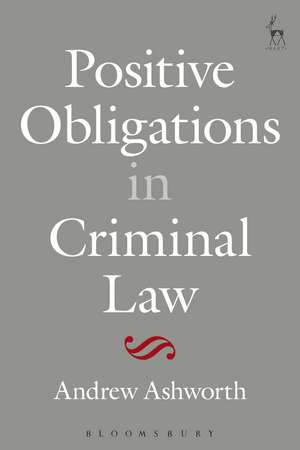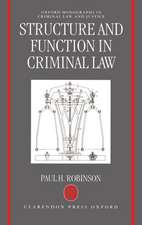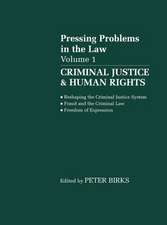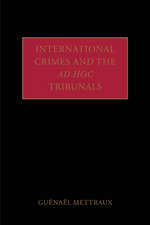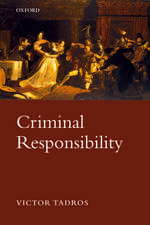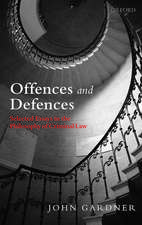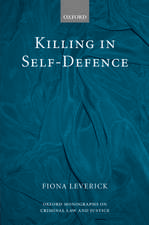Positive Obligations in Criminal Law
Autor Andrew Ashworthen Limba Engleză Paperback – 4 noi 2015
| Toate formatele și edițiile | Preț | Express |
|---|---|---|
| Paperback (1) | 218.00 lei 6-8 săpt. | |
| Bloomsbury Publishing – 4 noi 2015 | 218.00 lei 6-8 săpt. | |
| Hardback (1) | 497.48 lei 6-8 săpt. | |
| Bloomsbury Publishing – 20 aug 2013 | 497.48 lei 6-8 săpt. |
Preț: 218.00 lei
Preț vechi: 275.07 lei
-21% Nou
Puncte Express: 327
Preț estimativ în valută:
41.71€ • 43.67$ • 34.52£
41.71€ • 43.67$ • 34.52£
Carte tipărită la comandă
Livrare economică 05-19 aprilie
Preluare comenzi: 021 569.72.76
Specificații
ISBN-13: 9781849469890
ISBN-10: 184946989X
Pagini: 232
Dimensiuni: 156 x 234 x 18 mm
Greutate: 0.36 kg
Editura: Bloomsbury Publishing
Colecția Hart Publishing
Locul publicării:London, United Kingdom
ISBN-10: 184946989X
Pagini: 232
Dimensiuni: 156 x 234 x 18 mm
Greutate: 0.36 kg
Editura: Bloomsbury Publishing
Colecția Hart Publishing
Locul publicării:London, United Kingdom
Caracteristici
The author sets out to shed new light on contemporary arguments about the proper boundaries of the criminal law, not least by exploring the justifications for imposing positive duties (reinforced by the criminal law) on individuals and their relation to the positive obligations of the state.
Notă biografică
Andrew Ashworth CBE KC FBA is Vinerian Professor Emeritus of English Law in the University of Oxford and Emeritus Fellow of All Souls College.
Cuprins
1: Is the Criminal Law a Lost Cause? 1.1 Distinguishing Criminal Offences by Reference to their Content 1.2 The Procedural Distinction 1.3 The Functional Distinction1.4 Proceedings and Protections 1.5 The Seriousness of Wrongdoing 1.6 Equal Treatment, Countervailing Interests and Differential Enforcement 1.7 Criminalisation and Sentencing 1.8 The Principled Core of Criminal Law 2: Criminalising Omissions 2.1 The Place of Omissions in the Criminal Law 2.2 The Foundations of Legal Duties 2.3 A Re-appraisal of Duty-Situations 2.4 Omissions Offences and the Rule of Law 2.5 The Contours of Omissions Liability 2.6 Omissions as Offence-Elements 2.7 What Duty-Situations Should Require 2.8 Conclusions 3: Ignorance of the Criminal Law, and Duties to Avoid it 3.1 Is Ignorance of the Criminal Law No Defence? 3.2 The Ignorance-of-Law Doctrine and the Principle of Legality 3.3 Three Different Contexts for Ignorance of the Criminal Law 3.4 What are the State's Obligations? 3.5 Some Practical Implications 3.6 Conclusions 4: Should Strict Criminal Liability be Removed from All Imprisonable Offences? 4.1 What is Strict Criminal Liability? 4.2 Reasons for Requiring Fault for Criminal Conviction 4.3 Serious Crime: Limitations and Exceptions 4.4 Imprisonment Without Fault 4.5 Conclusions 5: A Change of Normative Position: Determining the Contours of Culpability in Criminal Law 5.1 Unlawful Act Theory 5.2 The Nub of Subjectivism 5.3 Moderate Constructivism, Autonomy and the Rule of Law 5.4 The Idea of Change of Normative Position 5.5 Determining the Effect of a Change of Normative Position 5.6 Change of Normative Position by Acting Knowingly 5.7 Moderate Constructivism Re-Stated 6: The Unfairness of Risk-Based Possession Offences 6.1 Risk-Based Possession Offences96.2 Possession Offences and Core Doctrines 6.3 Possession as a Form of Endangerment 6.4 If Possession is Criminalised, How should it be Sentenced? 6.5 Conclusions: Possession Offences and Criminal Law Doctrine 7: Child Defendants and the Doctrines of the Criminal Law 7.1 Childhood 7.2 Children as Moral Agents 7.3 The State's Response to Children's Bad Behaviour 7.4 The Effect of Childhood on General Defences to Criminal Liability 7.5 The Effect of Childhood on Consent 7.6 The Effect of Childhood on Mens Rea 7.7 Conclusions 8: Human Rights and Positive Obligations to Create Particular Criminal Offences 8.1 The Range of Positive Obligations under the European Convention on Human Rights 8.2 Duty to Secure Article 8 Rights 8.3 Duty to Secure Article 3 Rights 8.4 Duty to Secure Article 2 Rights 8.5 Duty to Secure Article 4 Rights 8.6 Conclusions 9: Epilogue: Emphasising the Positive
Recenzii
This is a timely and welcome collection of essays, both old and new, from the pen of someone who, I hesitate to remind him, has been, for not far short of half a century, one of the common law's most distinguished thinkers in the field of criminal law.
What comes cross throughout this book is how reasonable, principled and practical Ashworth is.It is...impossible to not be stimulated by this important book.
Ashworth's excellent, detailed study of various critical doctrines merits reading
...excellent essays on some central topics in the criminal law [and] is likely to be an important point of reference for many years to come....the arguments are impeccably researched and referenced, with excellent use of cases and illustrations. Ashworth integrates doctrinal and policy issues, as well as criminalisation and punishment questions, with a mastery of each.
[A] wonderful analysis of the thorny issue of omissions as the basis for criminal offending...Positive Obligations in Criminal Law offers readers quite valuable teachings on a host of subjects that are of everyday concern to the judiciary.
A very important and well researched book which it is hoped will be read by all[.] Judges, Law Teachers and Students should use this a a reference.
This is a noble book. It provides a wealth of evidence, analysis and practical issues from the aspect of English criminal law.
What comes cross throughout this book is how reasonable, principled and practical Ashworth is.It is...impossible to not be stimulated by this important book.
Ashworth's excellent, detailed study of various critical doctrines merits reading
...excellent essays on some central topics in the criminal law [and] is likely to be an important point of reference for many years to come....the arguments are impeccably researched and referenced, with excellent use of cases and illustrations. Ashworth integrates doctrinal and policy issues, as well as criminalisation and punishment questions, with a mastery of each.
[A] wonderful analysis of the thorny issue of omissions as the basis for criminal offending...Positive Obligations in Criminal Law offers readers quite valuable teachings on a host of subjects that are of everyday concern to the judiciary.
A very important and well researched book which it is hoped will be read by all[.] Judges, Law Teachers and Students should use this a a reference.
This is a noble book. It provides a wealth of evidence, analysis and practical issues from the aspect of English criminal law.
Descriere
This book offers a set of essays, old and new, examining the positive obligationsof individuals and the state in matters of criminal law.
